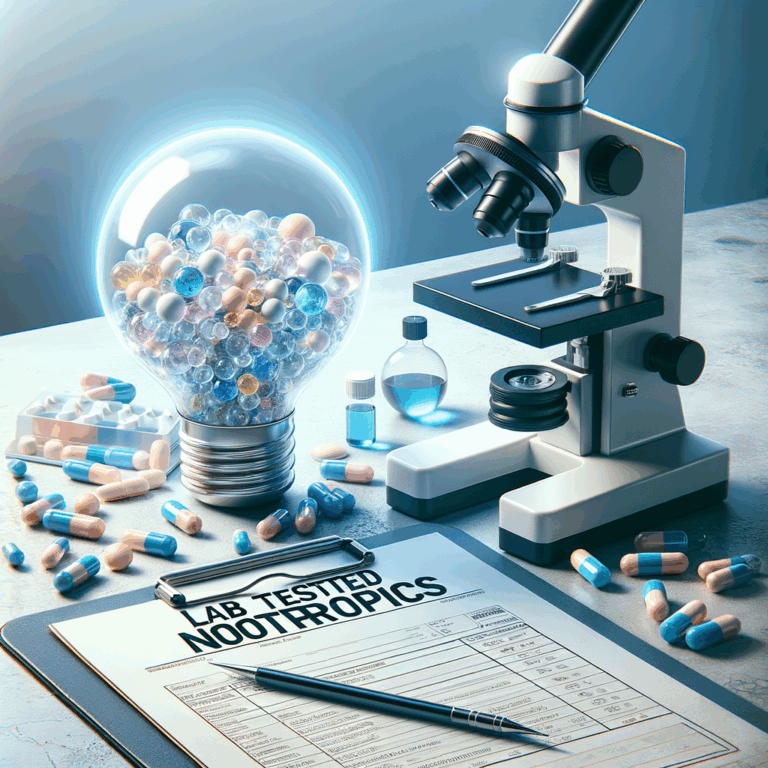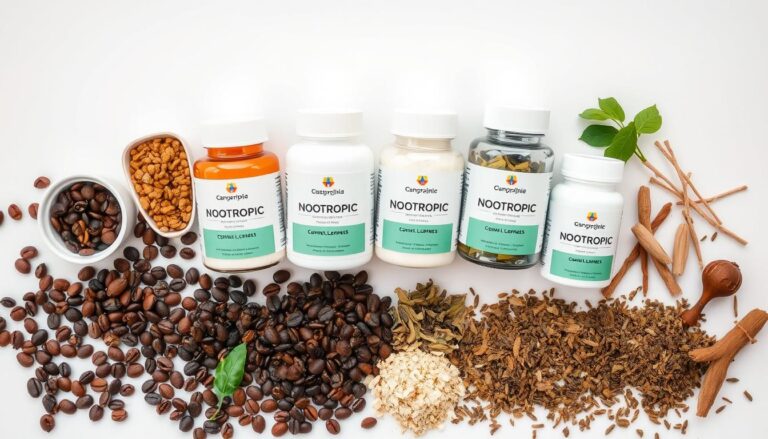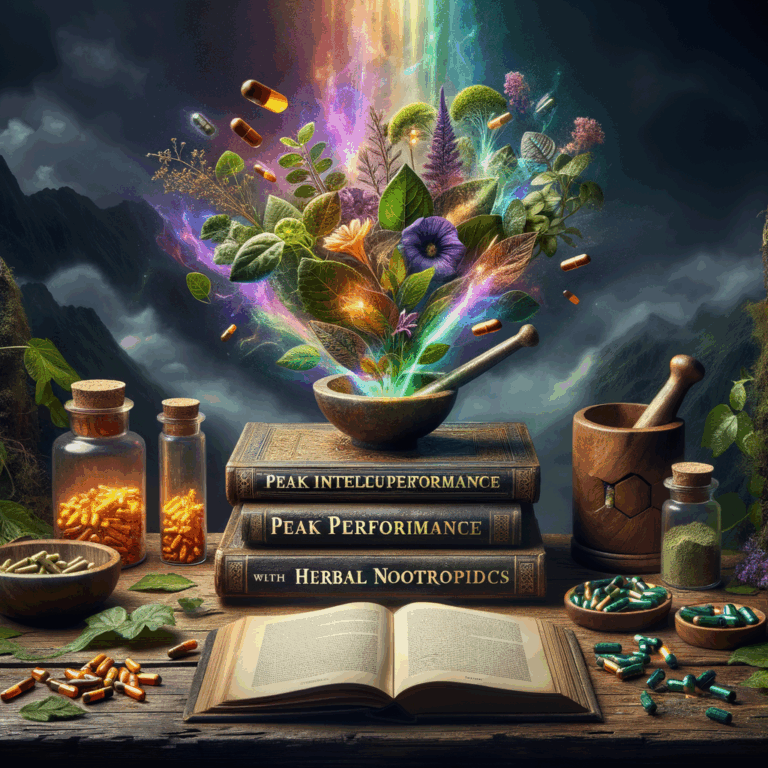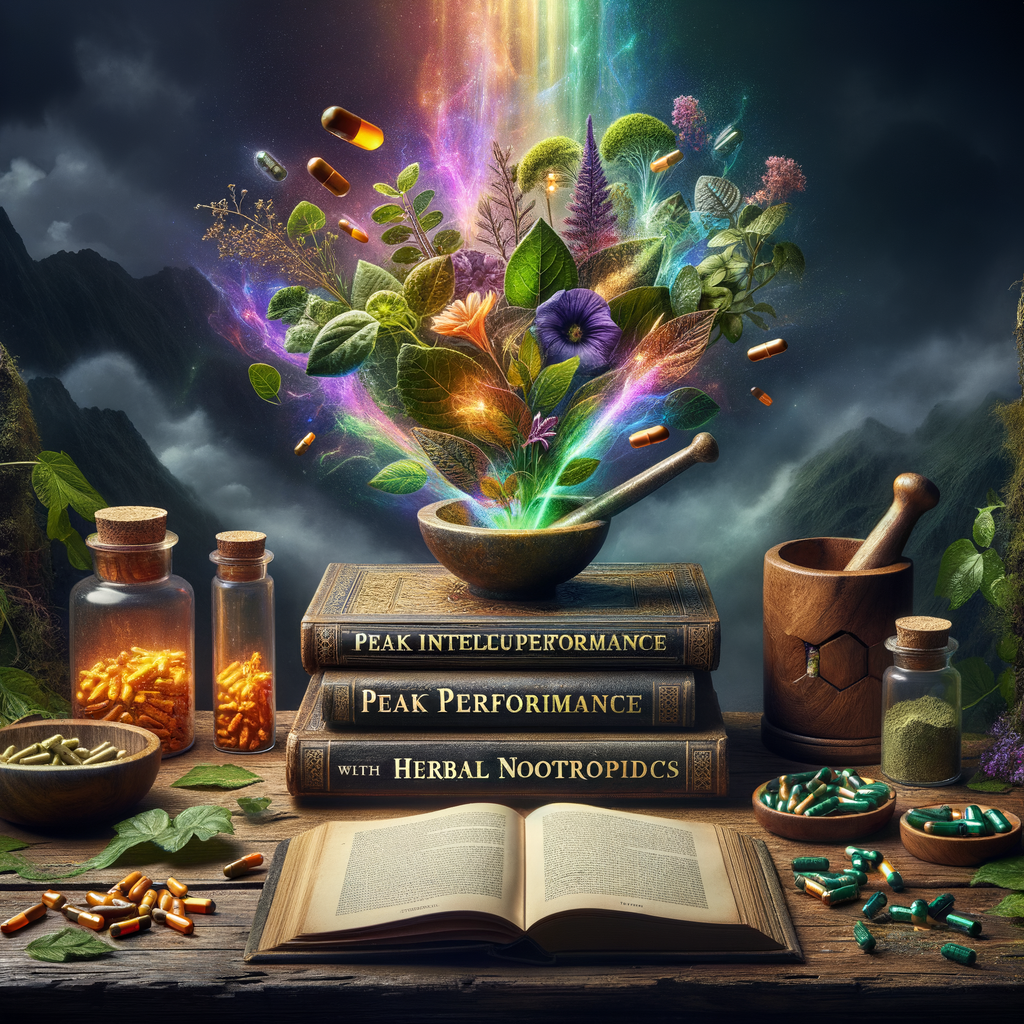
- Understanding Smart Drugs
- The Science Behind Nootropics
- Popular Herbal Nootropics
- 1. Ginkgo Biloba
- 2. Bacopa Monnieri
- 3. Rhodiola Rosea
- 4. Lion’s Mane Mushroom
- 5. Ashwagandha
- How to Choose the Right Smart Drug
- Considerations for Choosing Herbal Nootropics
- Potential Side Effects and Cautions
- Combining Smart Drugs for Enhanced Effects
- Example Combinations
- Lifestyle Tips for Maximizing Performance
- Prioritize Sleep
- Stay Hydrated
- Balanced Diet
- Regular Exercise
- Mindfulness Practices
- FAQs
- 1. What are smart drugs?
- 2. Are herbal nootropics safe?
- 3. Can I take multiple nootropics at once?
- 4. How long does it take to feel the effects of nootropics?
- 5. Are there any side effects associated with nootropics?
- 6. Can I use smart drugs for studying?
- 7. Do I need a prescription to buy herbal nootropics?
- 8. Do nootropics work for everyone?
- 9. Can I buy nootropics online?
- 10. Should I consult a doctor before taking smart drugs?
- Conclusion
- References
Understanding Smart Drugs
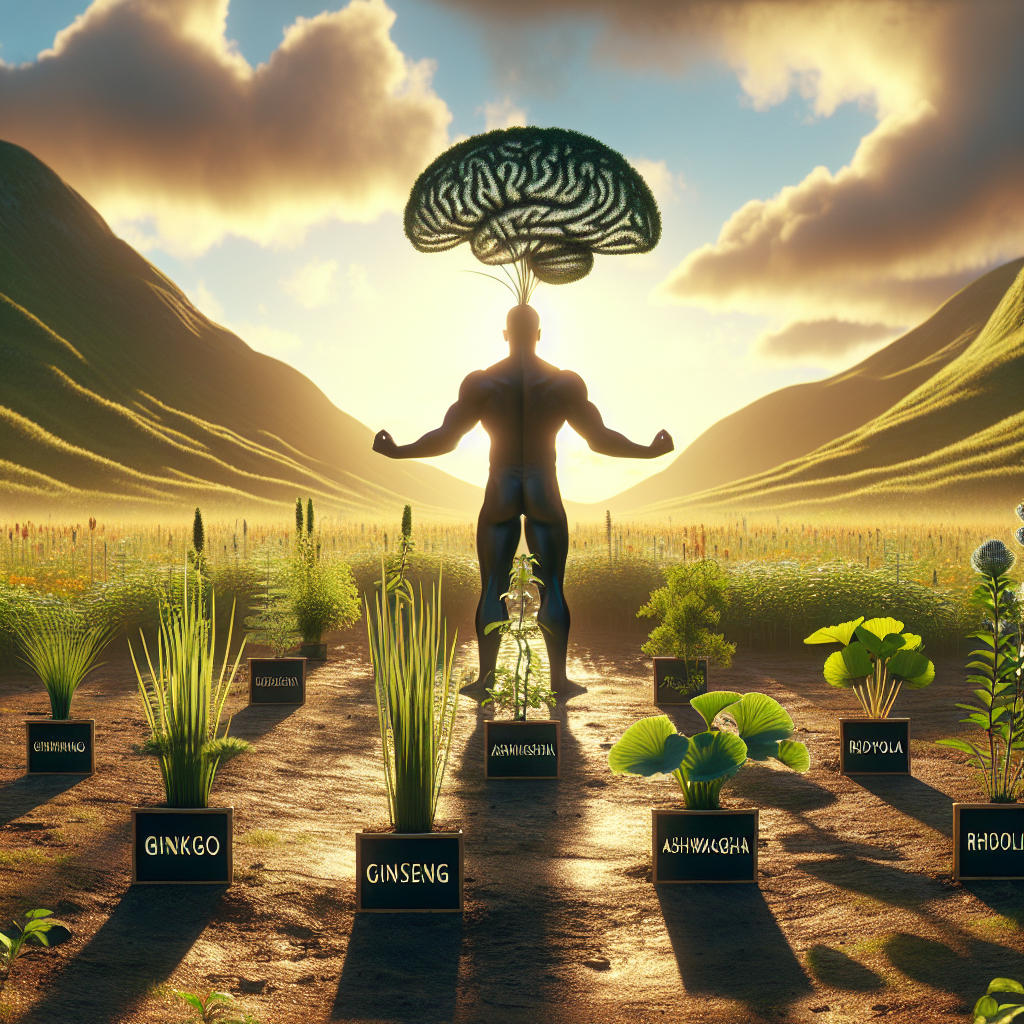
Smart drugs, often referred to as nootropics, have gained significant popularity among students, professionals, and anyone seeking cognitive enhancement. These substances aim to boost memory, creativity, focus, and overall brain performance. While many people think of synthetic substances when they hear “smart drugs,” a growing interest in natural alternatives, particularly herbal nootropics, has emerged. These natural options come with fewer side effects and a long history of traditional use.
Nootropics can essentially be classified into two main categories: synthetic and herbal. Synthetic nootropics include prescription medications like modafinil and Adderall, while herbal nootropics encompass various plant-based substances. The best part is that herbal nootropics often provide broader health benefits beyond cognitive enhancement. This article will explore several stunning herbal nootropics that can help you achieve peak performance.
The Science Behind Nootropics
The term “nootropic” was coined in the 1970s by Dr. Corneliu E. Giurgea, who identified several criteria that a substance must meet to be classified as a nootropic. These criteria include enhancing memory, protecting the brain, and having minimal side effects. Studies have confirmed that many natural herbs meet these criteria.
Nootropics work through various mechanisms. They may increase blood flow to the brain, support neurotransmitter production, or neutralize oxidative stress. Understanding these mechanisms helps individuals select the right herbal nootropics for their needs.
Here is a quick summary of how nootropics may work:
| Mechanism | Explanation |
|———————–|————————————————-|
| Neurotransmitter Boost| Enhances production of key neurotransmitters like dopamine and serotonin. |
| Blood Flow Enhancement | Increases blood flow to enhance oxygen and nutrient delivery to the brain. |
| Neuroprotection | Protects brain cells from damage caused by free radicals. |
Popular Herbal Nootropics
1. Ginkgo Biloba
Ginkgo Biloba stands out among herbal nootropics due to its extensive history. Originating from China, Ginkgo trees are among the oldest living species. The leaves of this tree have been used for centuries to improve cognitive function.
Research indicates that Ginkgo Biloba can improve memory and focus, particularly in older adults. It works by enhancing blood circulation in the brain, which can lead to improved cognitive performance.
Additionally, Ginkgo has antioxidant properties, helping to protect your brain from oxidative stress. While most people tolerate Ginkgo well, it’s always a good idea to consult a healthcare provider, particularly if you take blood-thinning medications.
2. Bacopa Monnieri
Bacopa Monnieri is another powerful herbal nootropic. This perennial herb hails from India and has been used in Ayurvedic medicine for centuries. Studies highlight its effectiveness in improving memory and cognitive abilities.
The active compounds in Bacopa, known as bacosides, enhance neurotransmitter signaling, especially serotonin. Users often report increased attention, faster information processing, and enhanced memory retention.
Moreover, Bacopa is known for its adaptogenic properties, helping your body manage stress. Regular use may lead to long-term cognitive improvements, making it an excellent choice for students and professionals alike.
3. Rhodiola Rosea
Rhodiola Rosea, commonly known as golden root, is celebrated for its mood-lifting effects. It grows in cold, mountainous regions and has been a part of traditional medicine in countries like Russia and Scandinavia.
Research shows that Rhodiola can reduce fatigue and improve attention. It works by balancing stress hormones and neurotransmitters, promoting well-being while boosting cognitive function.
In addition to cognitive enhancement, Rhodiola offers various health benefits. It may help combat stress, improve physical performance, and even mitigate anxiety. If you want a well-rounded herbal nootropic, consider adding Rhodiola to your regimen.
4. Lion’s Mane Mushroom
Lion’s Mane mushroom is an intriguing addition to the world of herbal nootropics. This edible fungus, resembling a lion’s mane, is famous for promoting brain health. Studies suggest that it stimulates the production of nerve growth factor (NGF), critical for neuronal health.
Individuals who consume Lion’s Mane often report improved focus and memory. It may also help alleviate feelings of anxiety and depression due to its neuroprotective properties.
Besides cognitive benefits, Lion’s Mane is also rich in antioxidants. Regular consumption may provide long-term brain health benefits, making it a versatile option for enhancing brain function.
5. Ashwagandha
Ashwagandha is a powerful adaptogen well-known in Ayurvedic medicine. Its calming effects can alleviate stress and anxiety, thus indirectly enhancing cognitive performance. The herb has been researched extensively, showing its role in enhancing overall well-being.
Studies suggest that Ashwagandha can improve memory and cognitive function while lowering cortisol levels—an essential factor in stress management. Additionally, it supports mental clarity and focus, making it an ideal choice for individuals facing high-pressure environments.
While many users benefit from Ashwagandha, it’s advisable to start with a lower dose and gradually increase it to understand how it affects you.
How to Choose the Right Smart Drug
Choosing the right herbal nootropic involves understanding your personal goals and health. Start by asking yourself what you want to achieve. Is it improved memory, enhanced focus, reduced anxiety, or a mix of these?
Considerations for Choosing Herbal Nootropics
1. Ingredient Quality: Look for reputable brands that use high-quality sourcing.
2. Research and Studies: A quick search for scientific studies can provide insights into the herb’s effectiveness.
3. User Reviews: While individual experiences can vary, reading user reviews can help you gauge the general effectiveness of a nootropic.
4. Consult a Healthcare Provider: Before starting any new supplement, especially if you have pre-existing health issues, consult a healthcare professional.
Potential Side Effects and Cautions
While herbal nootropics are often considered safer than synthetic options, they’re not entirely free of side effects. Some individuals may experience mild effects such as gastrointestinal discomfort, headaches, or fatigue.
Here’s a quick list of considerations:
– Ginkgo Biloba: Possible side effects include headaches, dizziness, and gastrointestinal issues.
– Bacopa Monnieri: Some may experience stomach cramps or fatigue.
– Rhodiola Rosea: High doses can lead to irritability or insomnia.
– Lion’s Mane Mushroom: Rarely, it may cause allergic reactions in sensitive individuals.
– Ashwagandha: Some users report digestive upset or drowsiness.
Maintaining awareness of these potential effects is crucial. Always start with a lower dose to gauge your body’s reaction before increasing.
Combining Smart Drugs for Enhanced Effects
Many users wonder if combining various herbal nootropics can yield better results. The answer is often yes! Certain compounds can work synergistically, enhancing cognitive function more than single-use.
Example Combinations
– Bacopa + Lion’s Mane: This combo may promote memory retention while boosting overall cognitive function.
– Rhodiola + Ashwagandha: This pairing can support stress management while enhancing focus and mental clarity.
When combining nootropics, start slowly and monitor your body’s response. This approach enables you to adjust the dosages and combinations effectively.
Lifestyle Tips for Maximizing Performance
While herbal nootropics can be incredibly beneficial, they work best in conjunction with a healthy lifestyle. To unlock your peak performance, consider the following tips:
Prioritize Sleep
Quality sleep significantly affects cognitive function. Aim for 7-9 hours per night and establish a calming bedtime routine to improve sleep quality.
Stay Hydrated
Dehydration can lead to fatigue and decreased cognitive performance. Drink enough water throughout the day to keep your brain and body functioning at their best.
Balanced Diet
Eating a nutrient-rich diet filled with fruits, vegetables, healthy fats, and proteins can provide your brain with the necessary nutrients it needs for optimal performance.
Regular Exercise
Physical activity boosts blood flow to the brain. Aim for at least 30 minutes of moderate exercise most days of the week.
Mindfulness Practices
Engaging in mindfulness exercises like meditation can significantly improve focus and mental clarity. Consider integrating brief mindfulness sessions into your daily routine.
FAQs
1. What are smart drugs?
Smart drugs are substances that aim to enhance cognitive abilities like memory, focus, and creativity.
2. Are herbal nootropics safe?
Most herbal nootropics have a long history of traditional use and are generally considered safe. However, individual experiences can vary.
3. Can I take multiple nootropics at once?
Yes, combining different nootropics can often yield enhanced effects, but it’s essential to start slowly and monitor how your body reacts.
4. How long does it take to feel the effects of nootropics?
Effects can vary by substance. Some, like caffeine, can produce effects quickly, while others may take weeks of consistent use to fully notice benefits.
5. Are there any side effects associated with nootropics?
While most herbal nootropics are well-tolerated, some individuals may experience mild side effects like stomach upset or headaches.
6. Can I use smart drugs for studying?
Many students use smart drugs to improve focus and memory while studying, but it’s crucial to combine them with healthy habits for the best results.
7. Do I need a prescription to buy herbal nootropics?
No, most herbal nootropics are available over-the-counter and do not require a prescription.
8. Do nootropics work for everyone?
Not every nootropic works for everyone. Individual responses vary widely based on factors like genetics, diet, and lifestyle.
9. Can I buy nootropics online?
Yes, many reputable suppliers offer a variety of herbal nootropics online. Be sure to read reviews and check for third-party testing.
10. Should I consult a doctor before taking smart drugs?
If you have pre-existing health conditions or are taking medications, consulting a healthcare provider is advisable before starting any new supplement.
Conclusion
Smart drugs, particularly herbal nootropics, offer exciting possibilities for enhancing cognitive performance. By understanding the benefits and potential side effects of various herbal options, you can choose the right substances that align with your goals.
Adopting a healthy lifestyle can amplify these benefits and help you achieve peak performance. Whether you aim to boost memory, improve focus, or reduce stress, the right smart drugs can significantly impact your daily life.
References
1. Psychology Today – Nootropics
2. Healthline – Bacopa Monnieri
3. Verywell Mind – Rhodiola Rosea
5. Nutritional Neuroscience – Lion’s Mane
By integrating smart drugs into your routine with mindfulness, you’ll find a boost in your cognitive abilities, potentially leading to greater success both personally and professionally.
